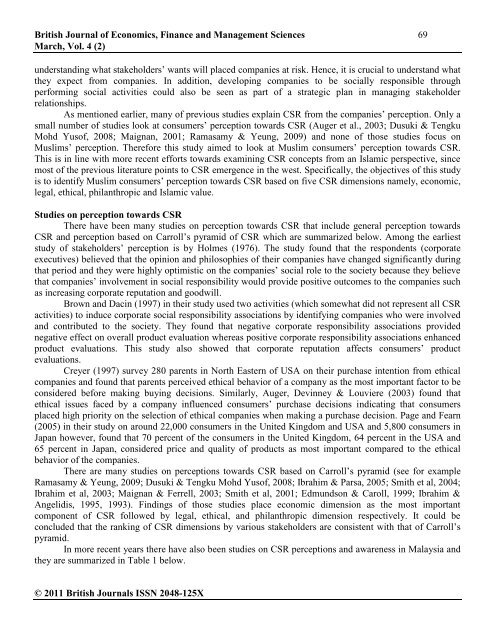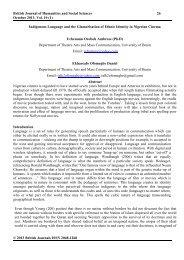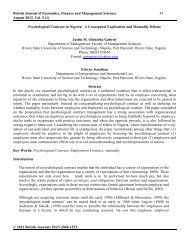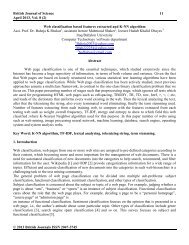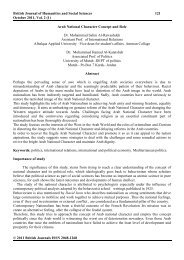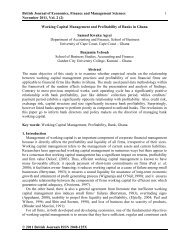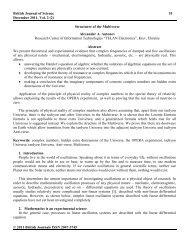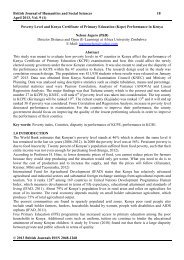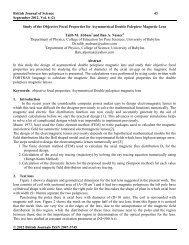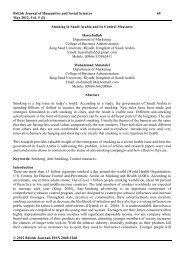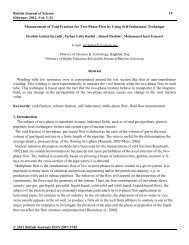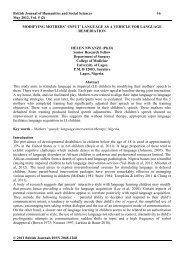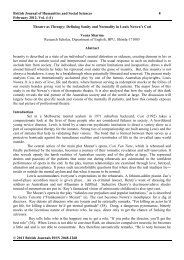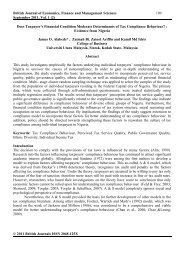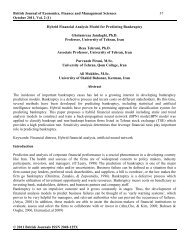the perception of muslim consumers towards corporate social ...
the perception of muslim consumers towards corporate social ...
the perception of muslim consumers towards corporate social ...
Create successful ePaper yourself
Turn your PDF publications into a flip-book with our unique Google optimized e-Paper software.
British Journal <strong>of</strong> Economics, Finance and Management Sciences 69March, Vol. 4 (2)understanding what stakeholders‟ wants will placed companies at risk. Hence, it is crucial to understand what<strong>the</strong>y expect from companies. In addition, developing companies to be <strong>social</strong>ly responsible throughperforming <strong>social</strong> activities could also be seen as part <strong>of</strong> a strategic plan in managing stakeholderrelationships.As mentioned earlier, many <strong>of</strong> previous studies explain CSR from <strong>the</strong> companies‟ <strong>perception</strong>. Only asmall number <strong>of</strong> studies look at <strong>consumers</strong>‟ <strong>perception</strong> <strong>towards</strong> CSR (Auger et al., 2003; Dusuki & TengkuMohd Yus<strong>of</strong>, 2008; Maignan, 2001; Ramasamy & Yeung, 2009) and none <strong>of</strong> those studies focus onMuslims‟ <strong>perception</strong>. Therefore this study aimed to look at Muslim <strong>consumers</strong>‟ <strong>perception</strong> <strong>towards</strong> CSR.This is in line with more recent efforts <strong>towards</strong> examining CSR concepts from an Islamic perspective, sincemost <strong>of</strong> <strong>the</strong> previous literature points to CSR emergence in <strong>the</strong> west. Specifically, <strong>the</strong> objectives <strong>of</strong> this studyis to identify Muslim <strong>consumers</strong>‟ <strong>perception</strong> <strong>towards</strong> CSR based on five CSR dimensions namely, economic,legal, ethical, philanthropic and Islamic value.Studies on <strong>perception</strong> <strong>towards</strong> CSRThere have been many studies on <strong>perception</strong> <strong>towards</strong> CSR that include general <strong>perception</strong> <strong>towards</strong>CSR and <strong>perception</strong> based on Carroll‟s pyramid <strong>of</strong> CSR which are summarized below. Among <strong>the</strong> earlieststudy <strong>of</strong> stakeholders‟ <strong>perception</strong> is by Holmes (1976). The study found that <strong>the</strong> respondents (<strong>corporate</strong>executives) believed that <strong>the</strong> opinion and philosophies <strong>of</strong> <strong>the</strong>ir companies have changed significantly duringthat period and <strong>the</strong>y were highly optimistic on <strong>the</strong> companies‟ <strong>social</strong> role to <strong>the</strong> society because <strong>the</strong>y believethat companies‟ involvement in <strong>social</strong> responsibility would provide positive outcomes to <strong>the</strong> companies suchas increasing <strong>corporate</strong> reputation and goodwill.Brown and Dacin (1997) in <strong>the</strong>ir study used two activities (which somewhat did not represent all CSRactivities) to induce <strong>corporate</strong> <strong>social</strong> responsibility associations by identifying companies who were involvedand contributed to <strong>the</strong> society. They found that negative <strong>corporate</strong> responsibility associations providednegative effect on overall product evaluation whereas positive <strong>corporate</strong> responsibility associations enhancedproduct evaluations. This study also showed that <strong>corporate</strong> reputation affects <strong>consumers</strong>‟ productevaluations.Creyer (1997) survey 280 parents in North Eastern <strong>of</strong> USA on <strong>the</strong>ir purchase intention from ethicalcompanies and found that parents perceived ethical behavior <strong>of</strong> a company as <strong>the</strong> most important factor to beconsidered before making buying decisions. Similarly, Auger, Devinney & Louviere (2003) found thatethical issues faced by a company influenced <strong>consumers</strong>‟ purchase decisions indicating that <strong>consumers</strong>placed high priority on <strong>the</strong> selection <strong>of</strong> ethical companies when making a purchase decision. Page and Fearn(2005) in <strong>the</strong>ir study on around 22,000 <strong>consumers</strong> in <strong>the</strong> United Kingdom and USA and 5,800 <strong>consumers</strong> inJapan however, found that 70 percent <strong>of</strong> <strong>the</strong> <strong>consumers</strong> in <strong>the</strong> United Kingdom, 64 percent in <strong>the</strong> USA and65 percent in Japan, considered price and quality <strong>of</strong> products as most important compared to <strong>the</strong> ethicalbehavior <strong>of</strong> <strong>the</strong> companies.There are many studies on <strong>perception</strong>s <strong>towards</strong> CSR based on Carroll‟s pyramid (see for exampleRamasamy & Yeung, 2009; Dusuki & Tengku Mohd Yus<strong>of</strong>, 2008; Ibrahim & Parsa, 2005; Smith et al, 2004;Ibrahim et al, 2003; Maignan & Ferrell, 2003; Smith et al, 2001; Edmundson & Caroll, 1999; Ibrahim &Angelidis, 1995, 1993). Findings <strong>of</strong> those studies place economic dimension as <strong>the</strong> most importantcomponent <strong>of</strong> CSR followed by legal, ethical, and philanthropic dimension respectively. It could beconcluded that <strong>the</strong> ranking <strong>of</strong> CSR dimensions by various stakeholders are consistent with that <strong>of</strong> Carroll‟spyramid.In more recent years <strong>the</strong>re have also been studies on CSR <strong>perception</strong>s and awareness in Malaysia and<strong>the</strong>y are summarized in Table 1 below.© 2011 British Journals ISSN 2048-125X


